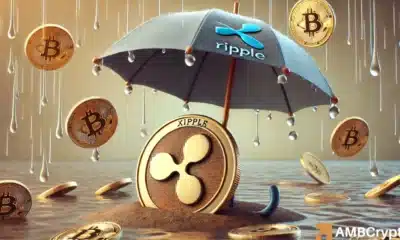Bitcoin
Bitcoin: El Salvador & Twitter, yes, but this proponent isn’t a fan of Lightning Network
A bird struck by lightning? Crypto made headlines recently after social media platform Twitter announced the integration of the Strike API so that its Tips feature would include crypto-payments.
— jack⚡️ (@jack) September 23, 2021
However, not everyone thinks the Lightning Network is the right choice for this mission. Popular crypto-influencer and writer Mr. Whale is one of them after he published an article titled ‘Why the Bitcoin Lightning Network is Satoshi Nakamoto’s Worst Nightmare.’
A highly stylized cover image in the same represented Strike CEO Jack Maller’s laughing face.
Why the #Bitcoin Lightning Network is Satoshi Nakamoto’s Worst Nightmare.https://t.co/jlC7f6UYDJ
— Mr. Whale (@CryptoWhale) September 26, 2021
What’s the debate?
The Lightning Network is a second-layer payment technology created to solve Bitcoin’s scalability challenge. In the article, Mr. Whale claimed that the Lightning Network is “completely flawed” because it is centralized. What’s more, he also alleged that it is unable to scale globally, infeasible due to Bitcoin’s volatility, open to governmental control in El Salvador, and vulnerable in multiple other ways.
The proponent concluded his arguments by stating that the Lightning Network is a trusted third party, one which defies the principles of Satoshi Nakamoto’s Bitcoin whitepaper.
Reality v. vision
What does Satoshi Nakamoto’s whitepaper say though? It said,
“Digital signatures provide part of the solution, but the main benefits are lost if a trusted third party is still required to prevent double-spending. We propose a solution to the double-spending problem using a peer-to-peer network.”
And yet, Mr. Whale claims that the Lightning Network has developed centralized hubs.
It’s worth noting, however, that Mr. Whale also spoke about El Salvador’s President Nayib Bukele. The blog post said,
“What he didn’t mention was how people would be forced to use Chivo, a fully centralized LN wallet. In a recent tweet, Bukele said “Chivo isn’t a bank” and he’s right. Chivo is 1000x more corrupt, and centralized than any bank on earth.”
He also went on to say that the government now has complete control over all of their citizen’s funds and can turn their wallets on or off whenever they want.
“We saw this first hand when on the day they launched they quickly shut down due to technical difficulties[.]”
At press time, the Lightning Network was recording 27,144 nodes and 73,936 channels. The average node capacity was 0.182 BTC or $7,890.15. On the contrary, Mr. Whale claimed that the network can only process about 2,800 BTC right now.
Here, it’s worth pointing out that Strike CEO Jack Mallers called the Lightning Network’s capacity an “inaccurate” metric.
Community sentiment
By and large, the Lightning Network has received good press, thanks to its presence in El Salvador and now Twitter.
2.1 million Salvadorans are ACTIVELY USING @chivowallet
(not downloads).Chivo is not a bank, but in less than 3 weeks, it now has more users than any bank in El Salvador and is moving fast to have more users that ALL BANKS IN EL SALVADOR combined.
This is wild!#Bitcoin??
— Nayib Bukele ?? (@nayibbukele) September 25, 2021
In fact, during a recent podcast, Mallers addressed people who have been attacking Bitcoin, the Lightning Network, and El Salvador’s BTC adoption. He said,
“But as a principled man, don’t get in the way of people improving the quality of their life in such a way that hasn’t been done in over two hundred years. It’s absolutely disgusting and shameful.”
